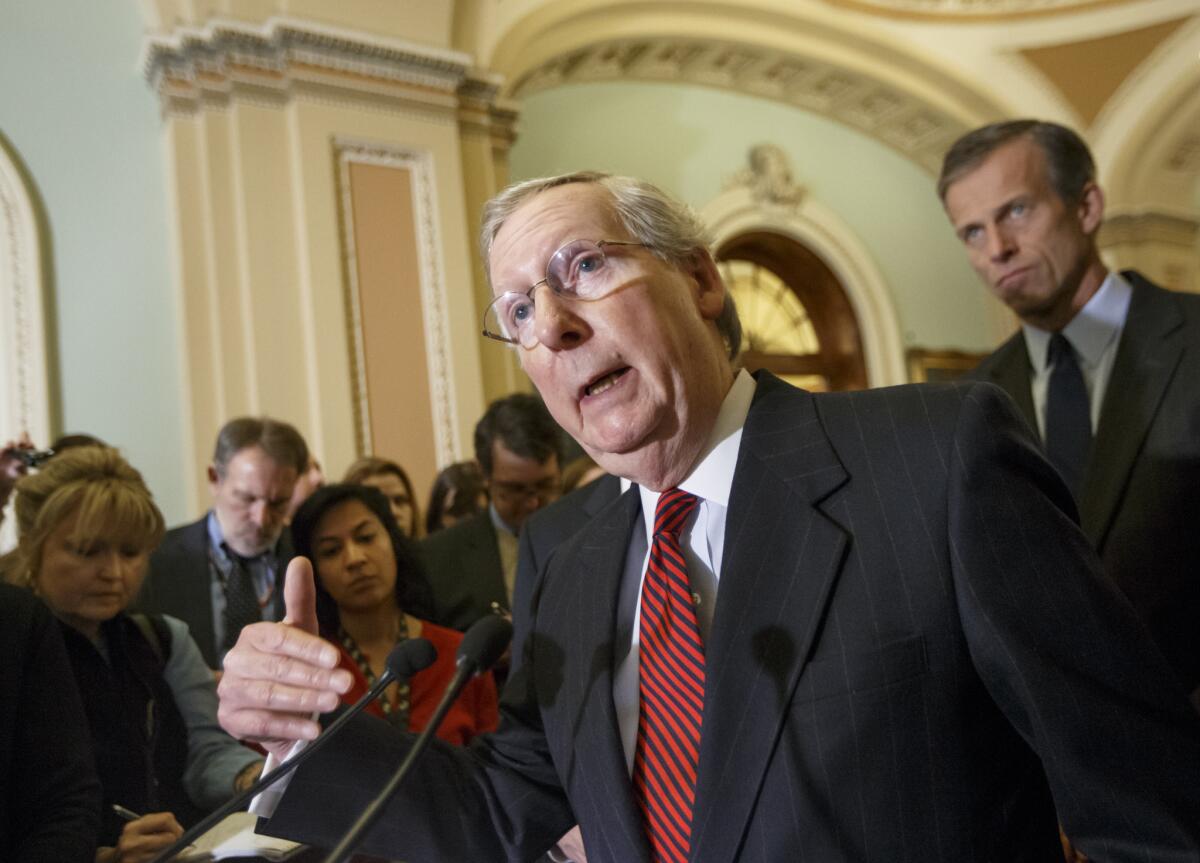Is GOP finally getting nervous that the Supreme Court might gut Obamacare?

It wasn’t so long ago that Republicans were viewing the prospect that the Supreme Court might overturn a key provision of the Affordable Care Act with unalloyed glee.
The court might “ultimately take it down,” Senate Majority Leader Mitch McConnell (R-Ky.) crowed in December. “You could have a mulligan here, a major do-over of the whole thing, that opportunity presented to us by the Supreme Court.”
We’re not hearing that so much these days, as the court prepares to take oral arguments on a major anti-Obamacare case next week. In the case, King vs. Burwell, conservative organizations argue that a five-word phrase buried in the ACA renders it illegal to award tax subsidies to insurance purchasers in three dozen states that opted out of setting up their own individual insurance exchanges, and chose to let the federal government do it for them.
Most legal experts, and the federal government, argue from legal precedent that a hyper-literal interpretation of a single phrase can’t be used to contradict the overall import of the ACA, which explicitly aims to bring affordable insurance to everyone in the country. But that will be up to the Supreme Court.
What’s making Republicans and conservatives nervous is the fear they’ll be blamed for the carnage resulting from a court ruling that strips tax subsidies from some 8 million residents and destroys the insurance markets of those three dozen states.
Ultraconservative Sen. Ben Sasse (R-Neb.) laid out the consequences starkly this week in a Wall Street Journal op-ed. “Chemotherapy turned off for perhaps 12,000 people, dialysis going dark for 10,000. The horror stories will be real. What will happen next is predictable: A deluge of attacks on Republicans for supposedly having caused this.”
In the Washington Examiner, conservative pundit Byron York quotes an unnamed GOP aide fretting about “ads saying cancer patients are being thrown out of treatment, and Obama will be saying all Congress has to do is fix a typo.”
Stuart Butler, a long-term strategist at the conservative Heritage Foundation -- in fact, one of the fathers of the individual mandate, which was a conservative idea before it got incorporated into the ACA and became a conservative imprecation -- similarly warns that a conservative victory in the King case could be a poisoned chalice. In an interview with Bloomberg’s Joshua Green, he acknowledged that the ACA already has been baked into much of the U.S. healthcare economy.
“All the major hospital systems and big insurers like Kaiser and Geisinger spent a ton of money adapting to the ACA,” he said. If subsidies are overturned in 34 or 36 states, “suddenly the market is misaligned. If you’ve hired all these new doctors and health-care workers to cover all these new people walking in the door, and they don’t come, what do you do? You lay them off.”
But as Butler observed in an analysis for the Brookings Institution, Republicans haven’t come up with an alternative for a Supreme Court-hobbled ACA, much less for a full-scale replacement for a repealed law. “As the months roll by,” he wrote, “maintaining a broad and determined coalition for reform is getting increasingly difficult.... More and more political air is leaking from the repeal balloon.”
Some conservatives grouse that the Obama administration has taken no steps to address the damage that would occur if the Supreme Court overturns the subsidies in so many states. Among them, amazingly, is Jonathan Adler, a law professor at Case Western Reserve University who helped craft the King case. “If they’re not looking at some kind of contingency plan, I think that’s irresponsible” he says. “It’s kind of like hostage-taking.”
The only effective response to an adverse court ruling, however, is legislative. Congress could make the King case moot with a simple five-word amendment to the ACA, like the countless amendments passed routinely to fix drafting errors and ambiguities in new statutes, major and minor. Or legislators and governors in the affected states could act to establish state exchanges, restoring their constituents’ eligibility for subsidies.
Jonathan Chait argues in New York magazine that the recent stirrings of conservative concern suggest that in the wake of an anti-government ruling in King, “Congress probably would be forced to act, and if it fails, many or most states would capitulate very quickly. We have all been looking at the politics of King v. Burwell backwards.”
That’s possible, but Chait may not be factoring in the power of Republican anti-Obamacare ideology. Some Republican states have expanded Medicaid because it makes economic and humanitarian sense; but many others still hew to GOP orthodoxy that such a step is a capitulation to evil Obamacare. Ideology might yet prevent the Republican Congress and Republican statehouses from acting rationally to ameliorate the effects of a Supreme Court ruling.
Sen. Sasse, whose op-ed was laced with familiar, and largely inaccurate, GOP attacks on the ACA, proposed a temporary fix to keep Republicans from “snatching defeat from the jaws of victory.” (The victory he refers to is a court ruling eviscerating the tax subsidies.)
First, Sasse suggests that Congress extend tax subsidies for residents in the affected states for 18 months to “protect suffering patients entangled in the court’s decision.” Then he wants Republicans to “unify around a specific set of constructive, longer-term solutions.... Simply opposing ObamaCare isn’t enough.”
The difficulty there is that the GOP hasn’t been able to craft an effective alternative to the ACA in four years. There’s no sign that it would be able to do so now, especially if its view of the ACA is as warped as Sasse’s. He writes that “ObamaCare’s command-and-control regime will reduce families’ choices, thwart innovation and chart a path of European-style debt and rationed access to health care” and that the ACA has exacerbated “this country’s health-care crises — cost and uninsurance.”
In fact, every objective analysis has shown that the ACA has brought down the rate of healthcare cost increases and materially lowered the nation’s uninsurance rate. If the GOP analysis of the state of America’s healthcare is as off-base as Sasse’s, the party has no chance of designing a reasonable plan of its own.
Keep up to date with the Economy Hub. Follow @hiltzikm on Twitter, see our Facebook page, or email [email protected].
More to Read
Inside the business of entertainment
The Wide Shot brings you news, analysis and insights on everything from streaming wars to production — and what it all means for the future.
You may occasionally receive promotional content from the Los Angeles Times.











